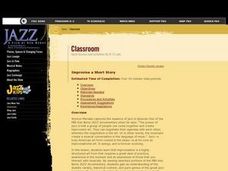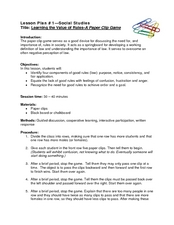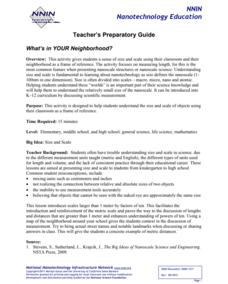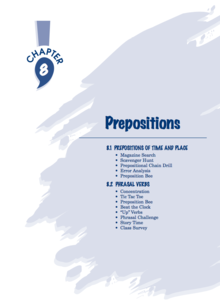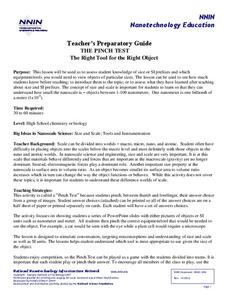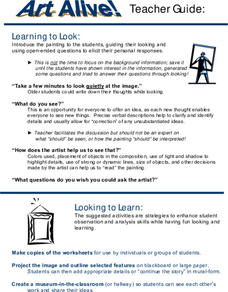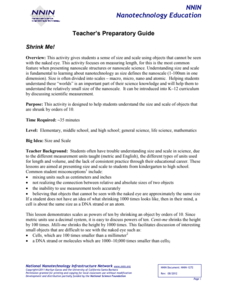Curated OER
Using a Sundial
Students examine the use of a sundial to tell apparent time. In this sundial instructional activity, students watch a teacher demonstration using a flashlight to create shadows. They discuss what happens to shadows of different objects...
Curated OER
Recycled Paper Making
Second graders investigate the life of a recycled newspaper by experimenting in class. In this recycling lesson, 2nd graders create their own recycled paper pulp by mixing an old newspaper into a bucket and adding water. Students...
Curated OER
Applied Science - Built Environment Lab
Young scholars evaluate trash. For this Science lesson, students collect and weigh trash from their classrooms. Young scholars categorize the trash and the corresponding weights, recording the information on a data sheet.
Curated OER
Agriculture Counts
Students practice counting. In this early numbers instructional activity, students learn about the beginnings of agriculture and how it ties into math. Students practice counting objects related to agriculture.
Curated OER
What's My Rule for Sorting?
Students view objects sorted by one characteristic and name that characteristic. In this sorting rule lesson, students explore to find a new characteristic and write a description of that rule. In early grades the rule might be supplied.
Curated OER
Shape Walk
Students go on a shape walk around the school. They record the shapes they see while the teacher take pictures for review back in the classroom.
Curated OER
Fabulous Fossils
Seventh graders investigate how fossils are formed and discuss how scientists determine the appearance of ancient plants and animals. They make fossils of everyday objects for others to identify. They make spreadsheets to display fossil...
Curated OER
Geometry Gymnastics
Students identify shapes and manipulate 2 and 3 dimensional objects. They view objects from different perspectives and review relative positions (near, far, between). They sing a shape song.
Curated OER
Improvise a Short Story through Jazz
Students evaluate jazz music and a jazz music performance. They collaborate and create an improvised group short story. They improvise a musical piece on found objects.
Curated OER
How Does a Satellite Stay in Orbit?
Students explore placing a satellite into orbit, then about forces needed to keep an object in orbit. They examine how satellites orbit in elliptical paths and about properties of ellipses. They learn Kepler's 3rd Law of Planetary Motion
Curated OER
What Does Respect Look Like in School?
Fourth graders discuss why everyone needs and wants to feel respected. As a class, they share what respect looks like and what disrespect looks like. They pretend they have to leave their most valued object with a secret agent and what...
Curated OER
Learning the Value of Rules - A Paper Clip Game
Using a game, learners discuss laws and fairness in society. In order to play the game, they line up in rows in the classroom. The teacher gives them paper clips based on their sex or other criteria. They can begin to discuss issues of...
Curated OER
From Object To Story
Students engage in a study that focuses upon the study of artifacts for the purpose of defining the heritage of family. They conduct research using a variety of resources. The information is used in order to create a personal family...
Curated OER
Space Facts
Students read space facts and click on the links to research more about space objects. In this space lesson plan, students read about comets, planets, the moon, and more.
PBS
Family History: Treasure Troves
It's time for show and tell! Scholars investigate historical artifacts to determine what secrets they reveal about the time periods they represent. They then research their own personal artifacts, as well as those from World War I.
National Nanotechnology Infrastructure Network
What’s In Your Neighborhood?
Chart your way to an understanding of nanoscale. Using a Google map, learners estimate a radius around their location of 1,000 and 1,000,000 meters. Predicting what 1,000,000,000 meters would look like takes them off the charts!...
K12 Reader
Prepositional Phrases II
Hidden within these sentences are prepositions; think your students can find them? After first reading a brief explanation of this part of speech, young grammarians are asked to examine eight sentences, underlining the prepositional...
CPO Science
Potential and Kinetic Energy
Here's a resource ideal for independent learners who need extra reinforcement or would like to work ahead. These textbook chapters and practice problems cover many basic physics concepts, starting with potential and kinetic energy and...
Savvas Learning
Prepositions
Learn about grammar the fun way! Eight activities about prepositions of time and place and phrasal verbs are sure to intrigue learners of all levels. Each activity requires minimal materials and set up, but will pay off in skills and...
National Nanotechnology Infrastructure Network
The Pinch Test
Test your pupils' understanding of the scale from macro to atomic. While displaying images of different materials, learners identify what they would need to make that material visible. Their choices range from the human eye to an...
Technical Sketching
Introduction — Surfaces and Edges
How different can 3-D and 2-D really be? An engineering resource provides an explanation about the importance of two-dimensional technical drawings. Several samples show how to create multi-view drawings from pictorials and vice-versa....
Memorial Art Gallery
Art Alive! - Beach at Blue Point
And then what happened? Class members engage in a series of activities that model for them how to read the story in a painting. Participants respond to questions that ask them to closely examine the elements in William Glackens' "Beach...
College Board
AP® Computer Science A: Elevens Lab Student Guide
Looking for a project to use in an AP® Computer Science class? Engage learners with a simple solitaire game called Elevens. Through these activities, learners break down the task and write the code for a game. Sign in to your College...
National Nanotechnology Infrastructure Network
Shrink Me!
The incredibly shrinking meter—decimeters to centimeters, to millimeters, and now to nanometers! Learners may have a difficult time visualizing particles on a nanoscale. Help them see a little clearer using a well-designed lesson that...
Other popular searches
- Classroom Objects Bingo
- Classroom Objects Coloring
- French Classroom Objects
- Classroom Objects in Spanish
- Spanish Classroom Objects
- Esl Classroom Objects
- Classroom Objects Vocabulary
- Naming Classroom Objects
- Objects in a Classroom
- Classroom Objects in French
- Classroom Objects Bingo Food
- Classroom Objects Lessons










